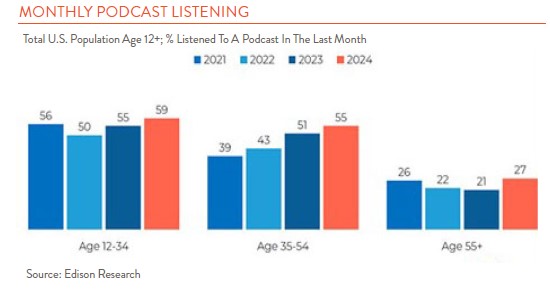Podcasts have had a big impact on the way Americans spend their time. The New Oxford Dictionary awarded podcast “word of the year” back in 2005, but the medium did not enter many Americans’ consciousness until 2014 when the true-crime podcast Serial was released, reaching a record (at the time) five million downloads. Today, podcasts are a regular part of our entertainment diet.
According to digital consulting firm Backlinko, just under 50% of the U.S. population over age 12 listens to a podcast at least once a month. While listeners tend to be younger, all age groups are increasingly tuning in (see chart below). The U.S. is home to many of the world’s podcast listeners – approximately 25% of the estimated 547 million worldwide – but the fastest growth is coming from Latin America and China. Listener totals in each of these countries are expected to exceed U.S. levels in the next few years.

The amount of content has exploded too over the past decade. Today, listeners have over four million podcasts to choose from on platforms such as YouTube, Spotify, and Apple Podcasts. The most popular have focused on comedy, entertainment, and politics, although today history podcasts are having their day in the sun with over one hundred million Americans now tuning in each week.
All this growth, however, does not suggest that the business is an easy one. A glut of money and content led to something of a shakeout in the industry over the past few years. But even today, in the face of reduced production budgets and fewer new titles, competition remains intense and failure rates high.
The podcast’s appeal is easy to understand. The format is uniquely portable and easy to access and the array of content, immense. But I think there is more going on behind the growing adoption rates. Most podcasts revolve around some form of storytelling, a tradition which has a long history in most human cultures. And, when well executed, podcasts provide listeners with a sense of connection and intimacy. As The New York Time’s reporter Reggie Ugwu recently described the experience, podcasts make listeners feel like they are “…silent guests at a communal table.” The soaring listening rates seen during the pandemic, a period of forced social isolation, illustrated podcasts’ unique ability to foster a sense of social connection.
If a heightened sense of connection is one upside of many podcasts, what is the downside? As the sources that we turn to for understanding the world evolve, it is worth considering the role that podcasts play in shaping our views. While podcasts can provide a sense of community and connection, they can also create something of an “echo chamber” or an environment where only beliefs and opinions consistent with our own are aired. Staying open to new ideas and opinions is never easy, but in this age of social and political division it is increasingly important.